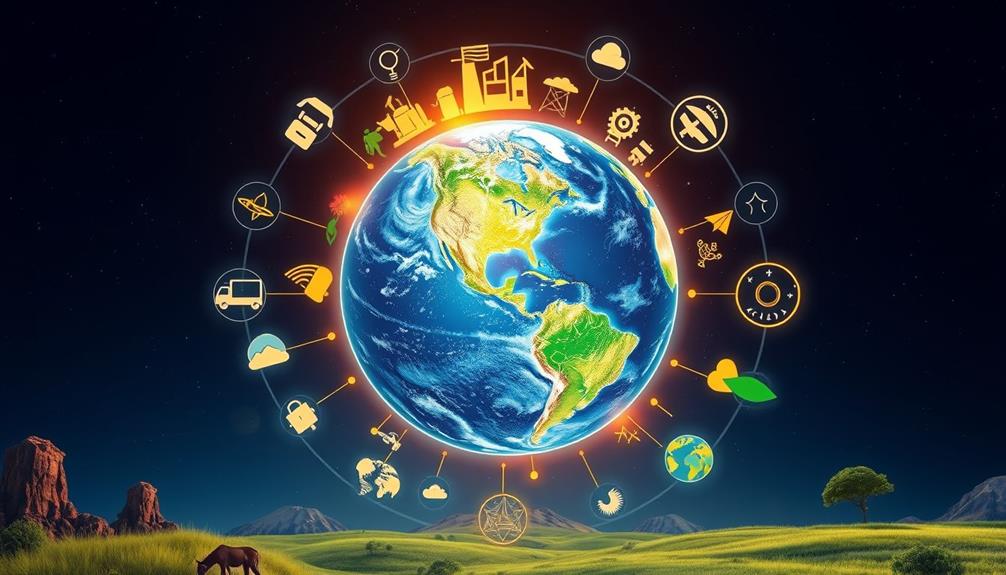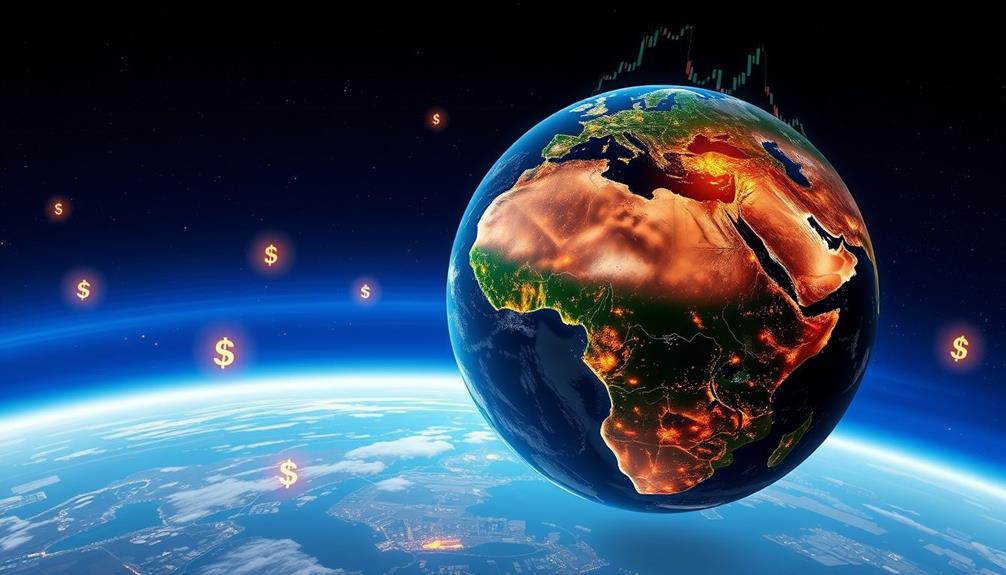Earth's true worth is absolutely staggering, estimated at around $13.7 quadrillion. This figure highlights the incredible value of our planet's resources and ecosystems, essential for supporting life. Freshwater alone accounts for about $73.4 trillion, while forests and coral reefs contribute substantially as well. These natural treasures not only provide essential services but also bolster global economies. The interconnectedness of these resources emphasizes the urgent need for sustainable practices. If you think this figure is mind-blowing, there's so much more to uncover about Earth's value and what it means for our future!
Key Takeaways
- Earth's estimated total worth is around $13.7 quadrillion, combining natural and human-made assets.
- The global ecosystem value is approximately $125 trillion, surpassing the total global GDP.
- Freshwater resources alone are valued at $73.4 trillion, making them the most valuable resource on Earth.
- Sustainable practices and conservation efforts could generate economic benefits estimated at $30 trillion in the long term.
- Earth's rich biodiversity and resources contribute significantly to its unique livability and economic potential, unlike other planets.
Understanding Earth's Ecosystem Value
When you think about the value of our planet, it's easy to overlook the staggering economic worth of Earth's ecosystems. In fact, a 2011 update estimated the world's ecosystem at approximately $125 trillion, which is about twice the global GDP. This immense figure underscores how essential ecosystem services are to our daily lives.
Among Earth's natural resources, freshwater stands out as the most valuable, with an estimated worth of $73.4 trillion. This resource is imperative for drinking, sanitation, and agriculture, directly impacting human well-being.
Trees and forests also hold immense value, assessed at $16.2 trillion, highlighting their role in providing ecosystem services like carbon sequestration and habitat for countless species.
Don't forget about coral reefs, which are valued at $9.9 trillion. They support marine biodiversity but are declining due to environmental degradation.
The World Economic Forum emphasizes that the annual global value of ecosystem services hovers around $125 trillion, reminding us of their fundamental contributions to both human health and the environment.
Recognizing this value is imperative for fostering sustainable practices and protecting our planet's invaluable resources.
Economic Contributions to Global GDP

Understanding the immense value of Earth's ecosystems naturally leads us to contemplate how these resources contribute to the global economy. The economic value derived from various industries showcases the essential role our planet plays. For instance, the gross world product was estimated at $78.2 trillion in 2014, emphasizing the scale of global activities.
Here's a breakdown of some key contributors to the global GDP:
| Sector | Contribution (in Trillions) | Importance |
|---|---|---|
| Global Oil Supply | $3.3 | Major economic driver |
| U.S. GDP (2018) | $19.3 | Highest contributor |
| Restaurant Industry | $0.709 | Significant service sector |
China's GDP of $12.24 trillion also highlights its substantial role in the economic landscape. Each of these sectors reflects how Earth's resources are intertwined with economic output, showcasing not just financial figures but the interconnectedness of sustainability and economic growth. By understanding these contributions, you can appreciate how crucial it is to protect our planet's resources for continued economic prosperity.
Insights on Global Market Values

Exploring the global market values reveals the staggering scale of financial assets that drive economies worldwide. When you look at the value of the world's assets, it's clear that our planet holds immense economic potential.
Additionally, as investors seek to diversify their portfolios, many are turning to alternatives such as gold, which can serve as a hedge against inflation and market downturns. This trend reflects a growing awareness of the need for IRA rollovers to gold that can protect retirement savings.
Here's a snapshot of key figures that illustrate this:
- Global Money Supply: Estimated at $90.4 trillion, reflecting the vast currency in circulation.
- Global Stock Market: Valued at approximately $73 trillion, indicating significant investor confidence.
- Real Estate Market: Worth an impressive $217 trillion, highlighting land's importance as an asset.
- Mineral Resources: Estimated at around $100 trillion, showcasing the economic potential of Earth's natural resources.
Together, these figures reveal not just the Earth worth regarding tangible assets, but also the interconnectedness of various markets. Each component plays a vital role in shaping global economic dynamics, affecting everything from investment trends to consumer confidence.
Understanding these values can provide you with a deeper appreciation for the financial systems that govern our world and the opportunities that lie within.
Calculating Earth's Total Worth

Calculating Earth's total worth reveals a staggering figure that encompasses both natural resources and human-made assets. Estimates suggest Earth's value is around $13.7 quadrillion. This includes a complex valuation by Dr. Greg Laughlin, who pegged the planet's worth at about $5 quadrillion, considering factors like mass, temperature, age, and its unique ability to sustain life.
Natural resources play an essential role in this valuation. They're estimated to be worth between $100.3 trillion and $125 trillion, with freshwater resources leading the pack at an impressive $73.4 trillion. These figures underscore the immense value of our planet's ecosystems, which provide pivotal services that benefit humanity.
In fact, ecosystem services are valued at roughly $125 trillion annually, highlighting their importance in our economy and overall well-being.
On the human-made side, assets like infrastructure and buildings contribute remarkably, valued at around $400 trillion. This figure further emphasizes the need for sustainable development to maintain and enhance Earth's value.
Understanding these calculations gives you a clearer picture of how intertwined natural resources and human ingenuity define our planet's worth.
Valuing Notable Natural Resources

When you think about Earth's resources, freshwater stands out as the most valuable asset, worth an astonishing $73.4 trillion.
Forest ecosystems also play an essential role, contributing $16.2 trillion by supporting life and regulating our climate.
Freshwater Resource Valuation
Freshwater is often regarded as the most precious resource on Earth, with an astonishing valuation of approximately $73.4 trillion. Its significance can't be overstated, as it plays a critical role in sustaining life and supporting economies worldwide.
Here's how freshwater contributes notably:
- Drinking Water Supply: Essential for human survival, it supports health and well-being.
- Agricultural Irrigation: Crucial for growing crops, it directly impacts food security.
- Industrial Uses: Freshwater is a key component in manufacturing processes, fueling economies.
- Ecosystem Services: Wetlands provide flood protection and water purification, contributing around $20 billion annually.
However, the value of freshwater is threatened by pollution, over-extraction, and climate change. The scarcity of this invaluable resource endangers not only human health but also the delicate ecosystems that depend on it.
You must recognize the importance of freshwater as one of our most critical natural resources. By valuing and protecting it, we can guarantee a sustainable future for ourselves and the planet.
Forest Ecosystem Worth
Forests hold immense value for our planet, estimated at $16.2 trillion, making them one of Earth's most crucial natural resources. They provide critical ecosystem services, such as carbon sequestration, which contributes about $50 billion annually to the global economy. By absorbing carbon dioxide, forests help mitigate climate change, showcasing their essential role in maintaining the value of Earth.
Moreover, forests support an astonishing 80% of terrestrial species, highlighting their significance in preserving biodiversity. This rich biodiversity isn't just about beauty; it's fundamental for healthy ecosystems that we all rely on.
The economic implications of forest loss are staggering. Projections suggest that deforestation and degradation could lead to a potential $500 billion hit to the global economy by 2050.
Additionally, forests offer valuable resources like timber, food, and medicine, underscoring their multifaceted contributions to human well-being and economic stability. Recognizing the value of these natural resources includes understanding the profound impact they've on our lives and the environment.
The preservation and sustainable management of forests are paramount to safeguarding their worth for future generations.
Coral Reef Importance
Coral reefs are another significant component of Earth's ecosystems, valued at approximately $9.9 trillion.
These vibrant underwater structures are essential for our planet, supporting countless marine species and providing numerous benefits. Here's why they matter:
- Biodiversity: Coral reefs house nearly 25% of all marine species, making them biodiversity hotspots.
- Fisheries Support: They play a critical role in sustaining global fisheries, providing livelihoods for millions of people.
- Coastal Protection: Coral reefs act as natural barriers, reducing storm impacts and erosion, potentially saving communities billions in damages.
- Tourism Revenue: Reef-related activities generate around $36 billion annually, boosting local economies through tourism.
However, these ecosystems face severe threats from climate change, pollution, and overfishing.
The decline in coral health not only jeopardizes marine life but also diminishes their economic value, making conservation efforts more urgent than ever.
By understanding the true worth of coral reefs, you'll see the importance of protecting these crucial ecosystems for future generations.
Let's act now to preserve the incredible value they bring to our world!
Methodologies for Valuation

When it comes to valuing Earth, various methodologies play an essential role in understanding its worth. You can see this through economic approaches that quantify natural resources like minerals and fossil fuels, and ecological assessments that measure the value of ecosystem services, such as clean air and water purification.
Dr. Greg Laughlin's unique formula estimates Earth's value at around $5 quadrillion by considering factors like mass, temperature, and age, alongside its capacity to sustain life.
The United Nations Environment Programme (UNEP) highlights that resource extraction has tripled over the last 50 years and anticipates a 60% rise by 2060, showing the increasing economic value of Earth's natural resources.
Moreover, the World Economic Forum places the annual global value of ecosystem services at about $125 trillion, underlining their crucial role in human well-being.
On the other hand, human-made assets, including infrastructure and technology, are valued at approximately $400 trillion. This emphasizes the significance of sustainable development in enhancing the overall value of Earth.
Ethical Considerations of Value

When you consider Earth's value, it's essential to weigh both its intrinsic worth and its instrumental benefits.
Recognizing nature as more than just a resource means embracing sustainable resource management that benefits everyone.
Intrinsic Vs. Instrumental Value
In discussions about the value of Earth, the distinction between intrinsic and instrumental value often emerges as a focal point. Intrinsic value highlights Earth's inherent worth, independent of human utility, while instrumental value focuses on the practical benefits ecosystems provide. Understanding these concepts is essential, especially in ethical debates regarding nature's role.
Here are four key points to reflect on:
- Intrinsic Value: Nature deserves protection for its own sake, existing beyond human needs.
- Instrumental Value: Earth provides essential resources like clean air and water that support human life and economies.
- Economic Implications: Robert Costanza's 1997 study estimated global ecosystem services at $33 trillion per year, showcasing their significance.
- Long-Term Sustainability: Neglecting intrinsic values for short-term instrumental gains can lead to irreparable damage to ecosystems, costing more than current global GDP.
Recognizing both intrinsic and instrumental values is fundamental for fostering sustainable practices.
Sustainable Resource Management
Sustainable resource management isn't just about guaranteeing we've enough for today; it's about making ethical choices that benefit both the planet and future generations.
By recognizing the true value of ecosystem services, estimated at around $125 trillion annually, you can understand how vital these services, like pollination and climate regulation, are to human life and economic stability. When we undervalue these services, we risk significant economic losses and jeopardize our future.
The reality is stark: the loss of biodiversity could cost the global economy up to $500 billion by 2050, while climate change may lead to economic risks of $23 trillion. This highlights the urgent need for ethical considerations in sustainable resource management.
By adopting sustainable practices, you can help create economic opportunities estimated at $23 trillion through renewable energy and conservation investments.
In essence, effective sustainable resource management isn't just a policy choice; it's a moral imperative. You have the power to make choices today that guarantee the health of our ecosystems and, ultimately, the well-being of future generations.
The time to act is now for both ethical and economic reasons.
Long-Term Viability of Earth

Ensuring Earth's long-term viability hinges on understanding the profound challenges it faces, such as the Sun's eventual transformation into a red giant in about 5 billion years.
This distant threat prompts you to reflect on how much does Earth really matter for future generations. To grasp the significance, consider these critical factors:
- Energy Requirements: Moving Earth to a more sustainable orbit demands an estimated 8.7 x 10^29 joules of energy, which equals 26 days of solar output.
- Economic Costs: Allocating resources toward planetary preservation carries substantial opportunity costs, especially when future value is discounted.
- Ecosystem Interconnectedness: The health of Earth's natural systems is interlinked; neglecting one aspect can lead to irreversible damage, threatening biodiversity and human survival.
- Changing Valuations: Future generations may prioritize Earth's value differently, underscoring the need for sustainable practices now.
Future Directions for Sustainability

A notable shift toward sustainability requires immediate action and collaboration across all sectors of society. You can play an essential role in this movement by adopting sustainable practices that enhance Earth's value.
The World Economic Forum highlights that ecosystem services hold an astounding annual global value of around $125 trillion. By prioritizing sustainable methods, you can help preserve these critical natural systems. Additionally, understanding your budget can empower you to make informed decisions that support sustainability.
Transitioning to renewable energy not only combats climate change but also opens up $23 trillion in economic opportunities. Investing in conservation efforts is equally important; it could yield an estimated $7 trillion in economic benefits while protecting biodiversity and ecosystems that we all rely on.
Technological advancements in resource management can greatly improve efficiency, allowing for better use of our natural resources. With a projected 60% increase in resource extraction by 2060, it's essential that you advocate for global cooperation and sustainable strategies to address these pressing environmental challenges.
Cultural Context of Earth's Worth

When considering Earth's worth, it's important to recognize not just its estimated value of $5 quadrillion, but also what that number represents regarding life and resources. This staggering figure reflects the incredible complexity and richness of our planet, making it clear why Earth is so precious.
Here's a quick look at what contributes to this value:
- Mass: Earth's sheer size plays a significant role in its ability to sustain diverse ecosystems.
- Temperature: The planet's ideal climate supports a vast array of life forms.
- Age: Billions of years of evolution have created intricate biological networks.
- Resources: Earth provides necessary materials like water, minerals, and fertile land, crucial for human survival.
In contrast, consider Mars, valued at just $16,000, and Venus, worth only a cent. Such comparisons highlight how much money Earth truly represents with respect to livability.
Valuing Earth fosters appreciation for its unique resources and promotes environmental stewardship, encouraging discussions about sustainable practices. Understanding Earth's worth deepens our cultural connection, inspiring interest in space exploration and the importance of protecting our home.
Frequently Asked Questions
How Much Is Our Planet Worth?
You might be surprised to learn that Earth's estimated worth is around $13.7 quadrillion, encompassing natural resources, ecosystem services, and human-made assets. This value highlights our planet's critical role in sustaining life and economies.
How Much Money Is Earth Worth?
You might be surprised to learn that Earth's worth is estimated around $13.7 quadrillion. This value includes natural resources, ecosystem services, and human-made assets—showing just how essential our planet is to life and economies. At this staggering valuation, Earth’s worth is undoubtedly richer than you think. It serves as a reminder of the planet’s irreplaceable value and the need to protect and conserve its resources for future generations. The true wealth of Earth extends far beyond monetary value, encompassing the bountiful biodiversity, intricate ecosystems, and the profound interconnectedness of all life on the planet.
How Much Is the Whole World Worth?
You might estimate the world's worth by considering everything—natural resources, human-made assets, and cultural significance. It's around $13.7 quadrillion, highlighting the immense value of ecosystems and resources essential for human survival and prosperity.
How Much Would It Cost to Buy One of Everything on Earth?
To buy one of everything on Earth, you'd need around $400 trillion. This staggering amount considers natural resources, ecosystem services, and human-made assets, highlighting the immense value our planet holds in various forms.
Conclusion
In summary, you might be surprised to learn that Earth's ecosystem services are estimated to be worth around $125 trillion annually. That staggering figure highlights just how essential our planet is to our survival and economy. As we navigate the challenges of sustainability, remember that every action counts. By valuing and protecting our natural resources, you're contributing to a healthier, more prosperous future for everyone. Let's work together to guarantee Earth's worth is recognized and preserved for generations to come!










